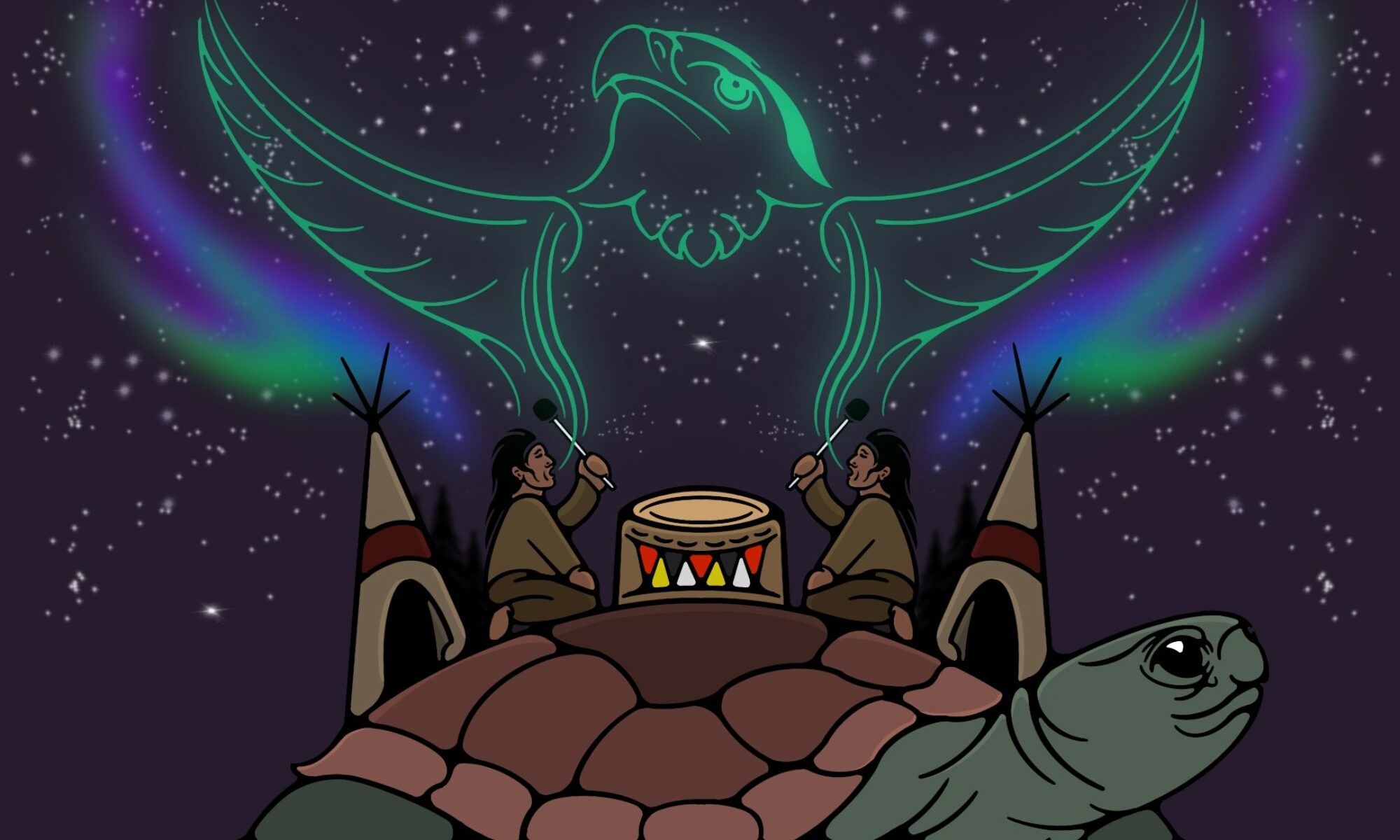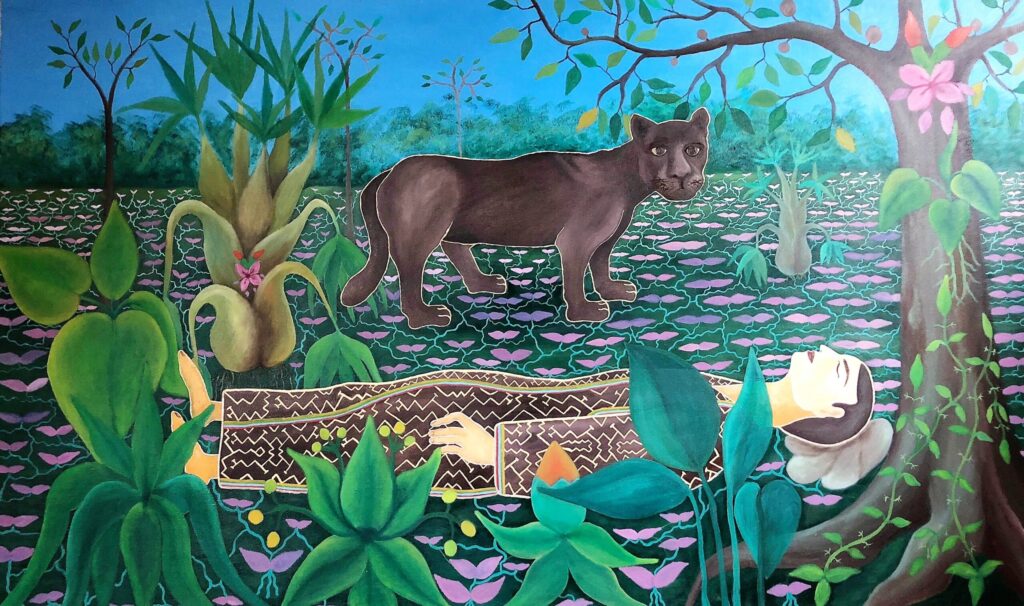
Advice and copy-editing in Spanish and Shipibo-Konibo by Manuel Gonzales (Menin Bari) and Eli Sánchez (Pakan Meni)
Chaikonibo © Translation from Spanish to English by Lorrie Jayne
Introduction by Juan G. Sánchez Martínez
Inin Niwe (Pedro Favaron) and Chonon Bensho (Astrith Gonzales) are spouses and enrolled members of the Native Community of Santa Clara of Yarinacocha, Shipibo-Konibo nation (Peruvian Amazon), where they founded the Nishi Nete Traditional Medicine Clinic, and an ethnobotanical garden. In recent years, through community work, Chonon and Pedro have shared their oraliture, documentaries, paintings, embroidery and conversations, with those who believe that creativity and clear words can heal the environmental and social imbalance in the Amazon and the world. As a response to the difficulty of making the Shipibo-Konibo ways-of-being intelligible, Chonon and Pedro have chosen a myth-poetic vocabulary to build an intercultural bridge: “the visionary doctors”, “the keepers of the medicines”, “the world of the Inka”, “the liquid wisdom”, “the kené designs”, “the perfumed people”. In constant learning with the Onanya –the community doctors/healers–, Chonon’s images and Pedro’s words/songs seem to be forged in a “vegetal time”.
Today, with the permission of the Ibo –the Keepers of the medicinal plants–, we present the poem “Chaikonibo” (translated into English by our dear Lorrie Jayne), where Chonon and Pedro translate into a “clear language” a complex experience of purging and reverie. In times of neo-shamanism, cultural appropriations, and migrations of the plants themselves, Pedro and Chonon remind us of traditional understandings of fasting and the link with the forest, as well as the responsibility of the legitimate doctors with the healing of the world. In this poem, the roots are not planted on ethnic, racial, national or religious identities, but on the Earth Mother and memory. Whoever forgets the territory, the river, the community, is at risk, because how can the forgetful-one use the visionary plants?
Thanks to Chonon Bensho and Inin Niwe (Pedro Favaron) for sharing this poem with Siwar Mayu. Inin Niwe (Pedro Favaron) has published Caminando sobre el abismo: vida y poesía en César Moro (Lima 2003); the novel Puka Allpa (Lima 2015); the poetry collections Movimiento (Buenos Aires 2005), Oeste oriental (Lima 2008) and Manantial Transparente (Mexico 2016); and the research Las visiones y los mundos: sendas visionarias de la Amazonía occidental (Amazon Center for Anthropology and Practical Application, 2017).
To read Chaikonibo as a PDF,
Chaikonibo
1. Moatian jonibo koshi shinayabo ikana iki, ani shinayabo, metsá shinayabo. Jatibi jaton koshi, jaton onan shinan, joa iki Nete Iboibakeax jainoaxribi rao meranoax. Jaboan onana iki yoyo iti ani jiwibobetan, niibobetan, isabobetan, parobetan, ianbobetan, baribetan. Jatona iká iki koshi joi. Tsoabi yoyo ibiresyamakatiai Moatian ikatikanai yoyo iosmabo, tsokas shinan-omabo. Non yosibaon noa yoikatiai nete benatian. Nai iká iki mai ochoma; jonibo yoyo ikatikanai baribetan, wishtinbetan. Jatibi ikatikanai jaskara joiyabires. Yapabo, maimeabo, peiyabo, jiwiboanribi ninkapaokatikanai noa yoyo ikai. Jaboribi yoyo ipaonike. Ani ianmeran Inka japaonike noa ochoma. Jakon Inkan jonibo axea iki jakoni jati, jakon akin shinanax, jatibi menianani, yoashitima, jaton mai oroti, yoá banati, yoá aki, jakon akin chopa saweti, jawetianbi sinakanantima, jatikaxbi teti. Moatian jonibo ikatikanai yoitibo, raro shinayabo. Jabo japaonike jaon rarokanai Papa Baribetan, Inkabobetanribi. Jaskara iitibi Ikana iki yoshina bakebokeska. Jakon akin shinayamakana iki. Ikana iki yoitimabo, jakonmai yoyo iki. Jaskatax Inka pikota iki, Kaa iki janbiribi jai wetsa neteoribiribi, jakon netenko, metsá netenko. Kakin boa iki ainboyabi benbobo jakon shinanyabo, jakoni jaabo, jan jato axeakeskati jakanabo.
1. The ancient ones had strong thoughts grand thoughts beautiful thoughts. The unfathomable strength of their wise thoughts came from the Great Spirit and the influence of medicinal plants. They knew how to speak with the greatest of trees with the forest, with the birds and the river, with the lakes and the sun. For them, the word was strong. No one spoke just to speak. The ancient ones were silent neither anxious nor restless. Our grandparents told us of the time when the world was new. The sky was not far from the earth, mankind could speak with the sun and the stars. Everyone spoke the same language. The fish, the beings that walk upon the land, the beings that fly and the trees listened to our word. They spoke too. In a great lake lived the Inka near to human beings. The kind-hearted Inka taught the ancient ones to live well, thinking well, sharing everything, without stinginess, tending the land, planting food, cooking, dressing well without ever quarreling, working together. The ancient ones were obedient, with happy thoughts. They lived with gratitude toward Father Sun and with the Inka as well. But after some time they began to behave like bedevilled children. They no longer thought well. They were disobedient and they spoke in an improper way. So the Inka left, and went to live in a different world, a good world, a beautiful world. He took with him the humble and generous men and women, those who had lived well, as he had taught them.
2. (Bewá) Eara bewai yakake Inka mai masene nete xaman paniax nai neten paniax paniake kainax nai nete xamanbi jakon nete kepenkin inka nete kepenkin. Ea bewa bewai mato non ninkakin nato bewa bewai nato metsá bewakan nato jakon bewakan koshi shinan bitaana ani shinan bitaana non Inka netenxon non bari papaka koshi Inka meraya rao ibo meraya jakon Inka meraya. Ea riki Onanya inkakeskaboribi jakon xawen Onanya Inka bake Meraya. Nokon metsá maiti inkan metsá maiti nete maitishoko keneyaki maiti Jaton neten yakaxon bewa bewabainkin metsá bewabano bewa bewashamani.
2. (Song) I am seated and singing in the perfect land of the Inka, in the depths of the heavens, suspended in the sky world, hanging in the most high, in the depths of the firmament, opening with my words the perfect world of the Inka I am singing a song To the health of the sensitive beings Intoning a profound song, a song of unfathomable beauty, a compassionate song that heals that carries the strength and spirit and infinite thoughts from the world of the Inka, from the soul of our Father Sun, and the great and wise Inka. from the spiritual Keeper of the medicine from the wise and generous Inka. I am a great healer as were the Inka a wise and good man, a son of the enlightened Inka. I wear a beautiful crown, a beautiful Inka crown, that holds the whole world in its lovely designs. In that good world I am seated while my soul journeys with the force of my beautiful song, with the depth of my song.
3. Nato neten Banekana iki non papabo kachianakeskabo noibatitishokobo, kikini teti ja jawekiatikopi jawen awinbo, jawen bakebo waiai, xoboai. Jaskatax jatikopi non papabo kikini tetaibo ikatikanai. Jabo oxas oxayamakatikanai neteamabi, bari pikotamabi. Moatian ainbobo tsinkikatikanai karo jan yoa ati aki, wai oroi, xobo matsoti, mapó akí, yoman timai, keweai. Moatian jonibaon akatikanai nonti akin, yomerakatikanai yoinabo, yapabo. Paro, niibo Ikatiai jainoa jawekiatibo jawebi maxkayamakatikanai. Moatian jonibo Ikatiai rao jaweki onanbo chikish raonti onanbo. Janin bichin rayatikopi. Benakatikanai janin jiwi taweneshaman janbi wenen-ai. Tsekakatikanai ja bichi pachikatikanai nete beamabi. Ja xeakatikanai jaixon samakatikanai bariapan kaman. Bakeranonbaon xeakatikanai rayá inoxon. Jainoaxribi manxaman kawati taxbakan xoxoai. Ininshaman jiwi chitari ininkeska jaonmea onantiribi. Jawen bichi iki kinanti janra poró chokai, yora jishtiai rayá itikopi, mecharibi manxankeska ja iki nato jiwi ibo nama meran noa axeai. Jaskarakopi non yosibo ipaonike mechabo. Jiwibaon raomepaokanike. Nii raobo ikatia jan raomekanaibo. Jawetianki ja bichi tsekakanai wetsa jiwimea yoyo ikatikanai ja jiwibetan, jakon akin yoikin onanmabo ixon: “Ea mecha imawe, ea rayá imawe, jakon shinaya ea inon, koshi shinaya, nokon kaibobo jawebi mashkatimakopi” Ja jiwi ibon ninkakatitai, jawen jointi oinxon; jakon shinayarin ixon koshi meninoxon, jawen ani onan shinan. Jiwi taponbora boai maixamaori jainoaxribi jene xamaori. Jawen poyanbo aniai neteori. Maimeabo, jenemeabo, oimeabo, bari papa neteorikeabo, naixamaoriabo jainoaribi ochaoma Nete Ibora joai jawen jakon raoboya jawen onan shinani niimea raobo. Moatian jakatikanai nii ochoma. Ikatikanai onanbo. Westiora yakatibo jakatiai ochochashokobo jatonbiri jakoni jaabo. Jawin kaiboboiba merati Bokatikanai nontin. Paro ikatiai moatianbi jaton bai jaskatax jaton kaiboboiba merati. Jonibaon shinan, jaton jointi ikatiai rarobires paro oinax, wetsa kaibobo shinantaanan. Yoikatikanai non yosibaon nete benatian moatian onayamakatikanai keweti. Iikinbi westiora ainbaon meraa iki parokexakea metsashoko jene ainbo oxaa iká iki jawen yora kewekanbi rakota kikin metsá. Jainoax ainbo jawen xobon karibaa iki, nokoxon tanaa iki ja oina kewebo. Jainxon peokana iki chopa keweakin. Parokeska iki kené Ja iki ianki tekitabo jemaboribi. Jatiribibo iki mayakené, mayá mayabaini parobokeska. Jatibi jawen metsabo, jawen raobo, jatibi jakonbo, jake jawen mestá kenebo. Noa riki paromea jonibo. Shipibo-konibo noa jati atipanyamake paro ochó. Yosiboan yoikatitai paro xaman jake wetsa jonibo ani shinaya. Moatian Merayabo jeneori bokatikanai jain jakatikanai ja paro jonibobetan jatonmea onani.
3. In this world our parents remained like orphans suffering greatly, travailing to feed their wives and children, building homes, planting gardens. In order to live our parents were hard workers. They woke before dawn, before the sun had risen. Women of old gathered kindling to cook, tended the gardens, swept the house , moulded the clay, wove their clothes and embroidered them with designs. Men of old built canoes, hunted and fished. The river and forests gave them all that they needed, they lacked nothing. The old ones knew the medicinal plants that cured laziness. The bark of the Tangarana kaspi made them hard-workers anew. They searched for a Tangarana tree tended well by its own ants. Cut the bark and soaked it before dawn. This is what they drank and later they fasted until noon. The youth drank as well (the bark of the Tangarana) so they could be hard workers. They also knew the Sarcha Garza tree that grows on the edges of lakes. A fragrant tree that smells of cinnamon and holds great knowledge. A purgative is prepared with it´s bark that cleans the stomach and wakes the body and makes a good worker and makes a good fisherman like the heron, who is the Keeper of that tree who transmits his skills and knowledge to us through dreams. This is why the old ones were good fishermen. The trees cured them. The old ones healed themselves with the land. When they stripped the bark of a medicinal tree they talked with the tree, they spoke with respect and asked to be taught: “Make me a good fisherman, Make me a hard-working man, a man of good thought, strong thought, so that my family may lack nothing.¨ The spiritual Keeper of the tree, listened to them, looked into their hearts: if they had good thoughts he transmitted his strength to them, and his great wisdom. The tree roots bury themselves in the water and beneath the water as well. Their branches reach to the sky. From the earth, from the rain, from the light of Father Sun, from the depth of the sky and from the Great Spirit come the good medicines and understandings of the plants of the forest. The old ones lived close to the forest. They knew it well. Each family lived a peaceful life far-removed from the others. They traveled in canoes to visit relatives. For the old ones, the rivers were the paths that united families. In their thoughts, in their hearts, they felt happiness contemplating the river, remembering their relatives. Our grandparents told that in the beginning of the world the ancient ones were not familiar with the kené designs. Until a woman found a gorgeous siren sleeping, on the river’s shore. Her body embroidered with designs of great beauty. The woman returned to her home; upon arrival she drew the designs. From that time forward the ancient ones began to embroider their clothes with designs. The kené designs are like rivers that unite the lakes to the people. Some are circular, turning and flowing like rivers. All that is beautiful, all that is medicinal, all that is good is covered with kené designs. We are people of the river. The Shipibo konibo we cannot live far from the rivers. The grandparents used to tell that in the depths of the river live other humans great wise ones. The ancient Meraya sunk in the water and they went to live with the spirits of the river so to learn from them.
4. (Bewá) Paro xaman kanoxon kanoshaman abano jene xamankoniax ani paro xamanbi. Nokon bewa bainkin jene xaman kanoni. Metsá jene ainbo jawen yora keweya metsá yorashamanbi metsá keweshamanbi. Nonbira yoinon noabira meninon jawen ani shinanbo jawen koshi shinanbo jene nete meninon jene nete kepenxon jawen koshi bitaanan jawen metsá bewakan nonribi onanon jene metsá netenxon jawen kewé netenxon paro xama netenxon. Jawen akoroninbi kawayonparibano jawen koshi biboi jainbira jonini jene neten jonini jene koshi jonini ja jene koiranti jene nete xamanbi. Jene ibo meraya merayashama riki jene rokotorobi jawen roninbobetan. Jawen noi roninbo jaton kewé neteo jaton metsá neteo jawen paro xamanbi.
4. (Song) Binding myself to the depths of the river forming a deep connection with the depths of the water, with the deepest depths of the great river. My song finds its way toward the depths of the water. Beautiful woman of the waters with a body embroidered with designs of indescribable beauty, embroidered with lovely and deep designs. We speak to her (the woman of the water) that she might grant us her infinite knowledges her strong thoughts that she might welcome us in the world of water, open the wisdom of the liquid world that we might receive its strength and its beautiful medicinal songs. Beside her we learn the wisdom of the water world of the world of embroidered designs, the depths of the river world. Over the spiritual boat (of the woman of the world of water) I am walking receiving strength from the hidden territory in which she became a human being, where the spirit of the water world was born, the strong spirit of water, who cares for the rivers and lakes, the depths of the aquatic world. The wise water woman is an enlightened being, with extraordinary gifts who rules over the dragons, Those colossal serpents live in the world of designs, in the lovely landscape, in the depths of the river.
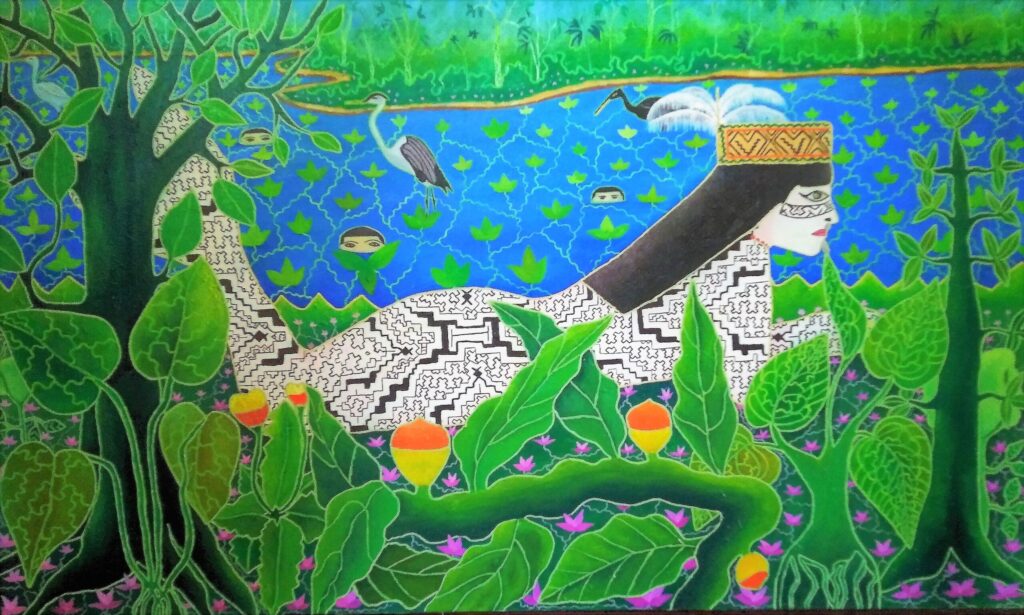
5. Jawetianki moatian jonibo Onanyakasi bokatikanai ochó niimeran peotashoko akax. Tsekakatikanai jiwi bichibo, koshi jiwibo, ani onanyati jiwibo, inoaxatankeska, anakeska. Jakoni yoyo ikatikanai ja rao ibobobetan: “Ea ani shinan meniwe, min panati ea meniwe, maton bewá ea onanmawe, isinaibo en jato benxoanon, nokon kaibobo akinon, Maton neterao ea kepenxonkanwe, eara raomis ikasai moatian jonibokeska”. Rao jene xeakatikanai jainoaxribi peibaon nashikatikanai. Piamakatikanai jaweti netebo jainxon samakatikanai oxebo winoti tashioma pii, bata piamai, yoranyamai, jaskati noibatiti koshi shinaya ikasi yoitanan: “Eara ikai ani Onanya joni, Kikin koshi Onanya, Jakon Onanya, Nete Ibon bake”. Jawetianki jawen yoraxama moa kerasma iketian, jawen shinan jakon-ira rao jonibo jaimashaman nokokatikanai. Jawen namameran axeai, jaton koshi menii, jaton onan shinan menii. Jaweratoboki Onanya ikasai iti atipanke jakon shinanya jato raonkasai jawen kaibobo jaton rao bewakan. Jawetianki samatai non kayara kai jatibi netenko: mai xaman kai rao taponbomeran; onanti jawetio chichorin ixon jawen jene neteoribi; jainoariibi mananmeran, shanka neteo, nai xamao. Ja samataikaya kai jemabotiibi rao nete ibobo, Chaikonibaon jeman. Nokokatikanai joni ja basi samata jonibo, inin peiraon nashiabo. Ja joné jonibo kenyamai non jakonma itsa. Xeteti jake raopei inin jaskaaraxon chaikonibo nokotikopi. Jatonra biai jakon shinaya jonibo, jakoni jaa jonibo, jakon joe Netemeran jawen jointiabi . Ja joné jonibo jawetianbi ramianayamakanai. Kikin raro shinayabo jakanke, Rao inin poataibo Nii xamameran ani jema ochó weanbotiibi. Jatibitian raota. Akanai jatonribi ani xeatiakin metsonananax ransai, mashá bewai. Jawetianki westiora Onanya Chaikoniboiba meratai aribakanai jaton bake bimakin. Jabaon jawetianbi potayamai, akinkanai isinaibo benxoatikopi . Kikin metsashoko ainbobo Joxo tena yorayabo. Jawen rayos Onanya meniai jawen koshi, jawen onan shinan, raonai itikopi yokakanaibo.
5. When the ancient ones wanted to be healers and wise on they would go live far away (from their families) in small retreats in the forest. They cut the bark from the trees which had spiritual force and from the trees with great knowledge like the ayahuma and the catahua. They spoke with them respectfully, with the Keepers of the medicine (to ask them to give them their strength, their knowledge): “Give me a grand thought, give me your protection, teach me your songs to cure the sick, to help my family. Open the medicinal world, I want to be a healer a wise one like the ancient ones.” They drank the medicinal water (in which the bark chips had been soaked) or they bathed with the leaves. They ate nothing for many days and then fasted for some months without salt, without sweets, without sexual relations, in this way they suffered with the strong thought saying: “I am going to be a great healer, a strong healer, a good healer, son of the Great Spirit.” When the depths of his body were clean and his thoughts were peaceful the medicinal spirits nearby approached, In dreams they taught, they gave him strength; they gave him wisdom. Those who wanted to be healers, had to have a strong mind and want to cure their family with the medicinal songs. During the fast our spirit travels through diverse worlds: sinks below the earth with the roots of the medicine; knows the deepest depths of the world of waters; as well as the mountains the world of rocks and the depths of the sky. The spirit of the faster travels through spiritual territories of the Keepers of the medicinal world, and visits the village of the Chaikonibo. Where only those who have fasted a long time, who have bathed with perfumed leaves may arrive. The hidden spirits don’t like bad smells. One must wear the scent of a perfumed plant to approach the Chaikonibo. They welcome only those who think well, who live in harmony with the light of the Great Spirit in their heart’s thoughts. The hidden beings (Chaikonibo) never argue among themselves. They live contentedly, emanating their aroma of plants, in the deep forest, in the creeks far from cities. Their clothes are adorned. They hold celebrations and dance hand in hand. singing mashá. When a healer comes across the Chaikonibo they give him their daughters to marry. They will never abandon him and will help him to heal the sick. They are beautiful women with very white skin, that gleams. His wise father-in-law gives him his strength, gives him his knowledge, to cure with compassion all who ask help.
6. (Bewá) Nokon bewashamanbi bewashaman kanoni rao bewashamabi metsá bewabanon Maya maya bainkin bewá keneabanon metsá keneshamanbi metsá keweabanon. Ea riki Onanya jakon joni Onanya rai rokotoroshamani nokon metsá maiti Nokon maitishamanbi biri biri mabokin inin bires maiti metsá keneshamanbi. Nokon metsá tari metsá tarishamanbi joxo tarishamanbi metsá keweshamanbi nokon pino tari keweya. Eakaya keyanon nai xaman panixon rao nete kepenkin rao neteshamanbi ani nete kepenkin metsá nete kepenkin jakon nete kepenkin inin nete kepenkin. Inin jema kanoni chaikonibaon jemakaya metsá jemashamanbi jaton metsá xobonbi raro inin nomabo mayá mashá itikaya. Nato metsá netenko ea riki awinya soi noma metsashoko ja riki nete biriai nokon papashokobo raro bewashamanxon. Rao nete ibobo mayá mayashamani nonra isinbo benxoai non metsá bewakan. Ea riki Meraya moatian jonibokeska nato xawan benxoai nato noma benxoai nokon rao bewashamaxon nete bewa shamaxon Nete Ibo jakon joi Nete Ibo rao joi.
6. (Song) With the depth of my song with the deep connection of the song, with the profound medicine of the beautiful song I open the path singing I go forth twirling and twirling forming a song with designs, with deep and lovely designs. I am a traditional healer a good and healing man, an Onanya of great wisdom, with a beautiful crown. I have a profound crown that vibrates resplendently perfumed and brilliant with a design of indescribable beauty. I have a tunic as well, a beautiful tunic, a white tunic, with lovely embroidered designs. It is my embroidered tunic that the hummingbird gave to me. My soul rises up and hangs in the boundless sky opening the deepest depths of the medicinal world. I open the limitless world, the beautiful, inexpressible world. the world without evil, the world of good, the world of medicinal aroma. I link myself with the perfumed people, with the soul of the Chaikonibo, with the profoundness of this village with its beautiful houses; happy and fragrant women twirl and twirl, dancing the mashá. In that beautiful world I have my wife she is a lovely bird everything in this world shimmers. And my dear grandparents sing with great happiness. The spirit Keepers of the medicine turn round and round from the deepest depths curing sickness with the soul of our beautiful songs. I have the knowledge of the Meraya just as the ancient ones had and I am curing this man and I am curing this woman with the depth of my song, and the depth of the medicinal world, and the good word of the Great Spirit, the medicinal word of God.
7. Moatian jonibo ikatikanai koshibo onan jonibo. Jakatikanai Inkan jato axeakeska. Rama Inka jake wetsa neteori, wetsa paroori, noakeskama netenko, jakon netenko. Jabo mawayamai, keyoisma Inka. Noa riki bakebo moatian Merayabo. Noa iti atipanke jatokeskaribi. Non yosibo jake non jointiainko; bewakanai Inkabobetan. Non rao onanketian, non jakon akin samaketian, yosibaon noa namameran noa benai. Noa bokanai non onanyamaa parobaon; noa onanmakanai icha jawekibo jatibi raomeranoabo. Noa koshi menikanai, jaton onan shinanbo, jaton ani shinanbo, jakon joi tsonbi noa paketimakopi. Ramara noa jake “moderno” netenko ikaxbi noa shinabenoti atipayamake non rekenbo. Jaskatax jatikopi jemabotiibi nato ani paron, jatibitian koshi itikopi, noa jati iki non rao ochoma, ani nete namati. Rome koinman non atipanke yoshinbo ishtomakin noa ramiakasaitian. Non jakon akin samaketian Chaikonibaon noa axeati atipanke, jaton koshi menikin, jaton jakon shinanbo, noa jakon jatikopi, ikonshaman jonibokeska itikopi.
7. The ancient ones were strong and wise. They lived as the Inka had taught them. The Inka now live in another world, in another river, in a world that is different from ours, in a good world He never dies, He is the Inka eternal. We are children of the ancient healers and we can be as they have been. Our grandparents live in our hearts; and continue to sing along with the enlightened Inka. If we know our plants, if we fast well, the grandparents will visit us in dreams. They journey with us to unknown rivers and they teach us many things about medicinal plants. They give us their strength, their wise thoughts, their infinite thoughts, a good word so no one can defeat us. Now we live in the modern world but we can never forget our ancestors. In order to survive as a nation of this great river we must remain strong, close to our medicines, dreaming of the boundless worlds. With the smoke of tobacco We must dispel the demons that would destroy us. If we fast well the Chaikonibo can teach us, give us their strength, their good thoughts, that we may live well as true human beings.
About the translator
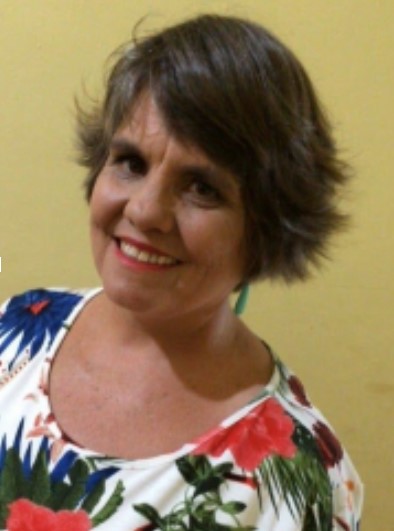
Lorrie Jayne, a collaborator in Siwar Mayu, teaches Spanish, Portuguese, and Personal Narrative in the Languages and Literatures Department at University of North Carolina Asheville (USA). She lives with her husband and daughters in the Appalachian Mountains where she enjoys plants, people, and poetry.
For more about Chonon Bensho, Pedro Favaron and the Shipibo-Konibo nation
Chonon Bensho’s paintings and embroideries, previously featured on Siwar Mayu
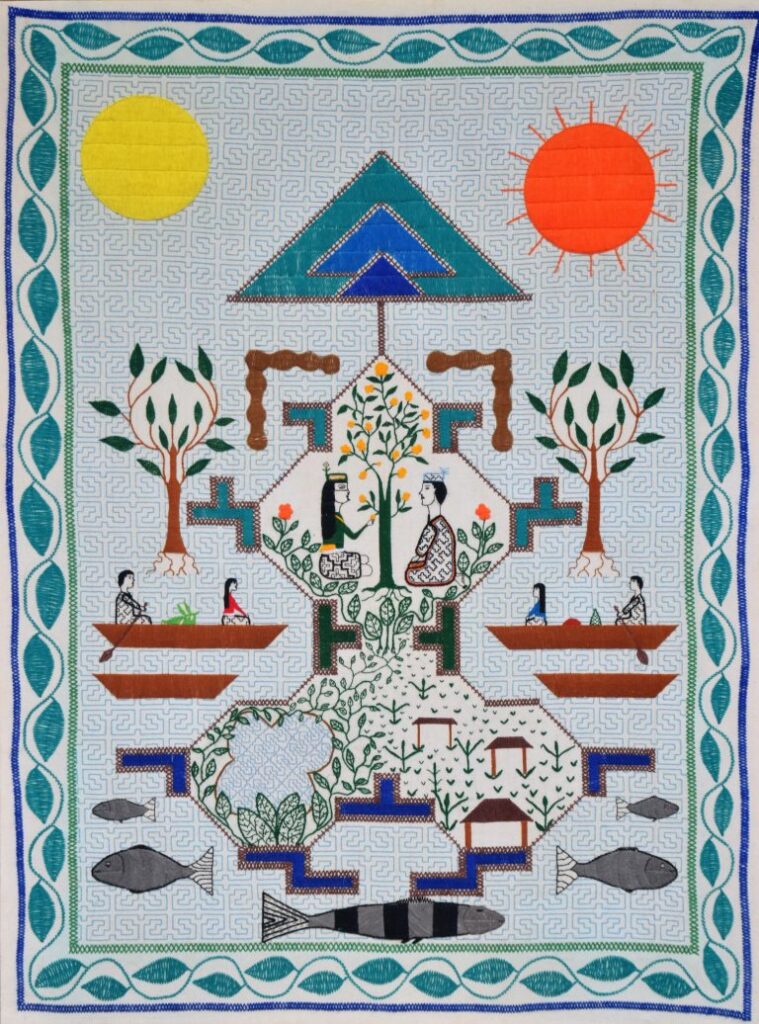
The Shipibo Manifesto, Red Antisuyo :
An explanation of the ancestral use of Ayahuasca, Red Antisuyo:
